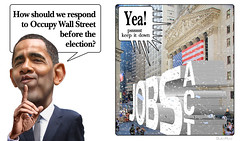 On the surface, President's Obama's recently signed the JOBS Act, for Jump-Start Our Business Start-Ups, which will roll back restrictions on the way start-up companies can raise money from individual investors, seems like a win-win for small businesses. But says management, strategy and branding consultant Steven Mason, president of the Brand Mason, there is more to it.
On the surface, President's Obama's recently signed the JOBS Act, for Jump-Start Our Business Start-Ups, which will roll back restrictions on the way start-up companies can raise money from individual investors, seems like a win-win for small businesses. But says management, strategy and branding consultant Steven Mason, president of the Brand Mason, there is more to it."The JOBS Act is a boon to private companies, which drive job creation and the GDP. The most significant impact of the recently passed JOBS Act is that private companies will be able to raise money from individuals who are not "accredited". This means that investors who have not been considered wealthy enough by the SEC to be designated an accredited investor will now be able to make direct equity investments in private companies,” says Brian Hamilton, CEO of financial information company Sageworks and a noted expert on privately-held companies. “It would be hard to overstate the implications of this legislation as it allows small investors access to a market that previously didn't exist to them. Additionally, it gives private companies access to millions of dollars they couldn't previously tap into. It introduces some risk for a new class of investors, but it is very positive for private companies."
 |
| BEA logo (Photo credit: willida) |
Among other things, it would allow them to raise small sums from investors via the Internet. According to Obama, websites will be closely monitored by the Securities and Exchange Commission. Some critics say this component of the bill may leave people vulnerable to fraudulent online schemes. “The abundance of online options for connecting unaccredited investors with private companies presents an inherent potential for fraud and misrepresentation and may draw in undiscerning investors,” notes Hamilton.
There are other cons, he points out. “Comparatively riskier investment opportunities will become available to unaccredited investors since new companies are always the least well known and many young companies fail,” he says. “As far as IPO investing is concerned, private conversations with the SEC about disclosures are not released immediately, and while the company may benefit, it's hard on investors seeking transparent information.”
Also, “crowd-funding platforms and this type of investing are so new that there is likely to be additional fraud. The risk factors of these investments should be made clear. Maximum amounts that individuals can invest based on their income is at a minimum now,” says Hamilton.
David M. Williams, founding director of professional consultant firm Business Enhancement Associates, agrees. “Crowdfunding investors would have no control in management decisions, and no guarantee that their interests would be represented. Small investors add liability, investors who would normally not be qualified or accredited. And the lack of SEC oversight or Sarbanes-Oxley guidelines make fraud or mismanagement more likely,” he says. There are other drawbacks to the bill he says. “It adds the burden of up to 200 shareholders to management used to closely-held ownership. It also complicates future equity raises, debt financing or recapitalization,” says Williams.
Among the other negatives, says Mason, are "you can raise a maximum of $1,000,000 in any 12-month period and individuals can't invest whatever they want. They are limited to investing percentages of their income and net worth and there's only so much they can invest in one year, across all crowdfunded companies." There are restrictions that may also hinder small businesses seeking funding under the new bill. "Funding Portals have to be registered with the SEC and the SEC hasn't even written all the regulations for them yet, so if the regulations are onerous enough, the entire point of this crowdfunding could be a chimera. Basically, the SEC and the government have the power to make this a complete boondoggle, because these Funding Portals are subject to so many restrictions that it's going to cost issuing companies real money just to comply," Mason points out. "There are significant accounting fees companies will have to incur, and if they are raising more than $500K, they'll need audited financial statements, which are very expensive."
 |
| Occupy the Jobs Act (Photo credit: DonkeyHotey) |
The bill was supported by bipartisan lawmakers and entrepreneurs.







No comments:
Post a Comment